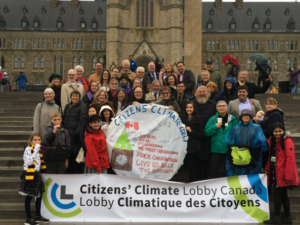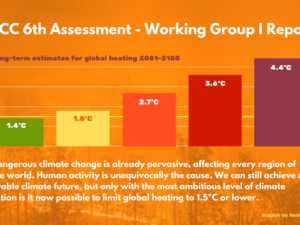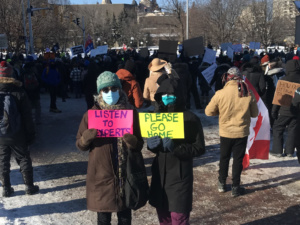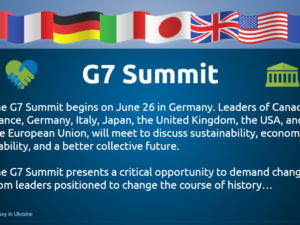
PRESS RELEASE
The report of IPCC Working Group II on Impacts, Adaptation, and Vulnerability is another red alert regarding the danger of steadily worsening climate impacts. The narrow window of opportunity is rapidly closing for successful mitigation of and adaptation to global climate destabilization. Starting to adapt only when emergency arrives will be too late. Failure will mean widespread human suffering on an unprecedented scale.
Among the key takeaways:
- We have entered the era of human-induced losses and damages due to climate change, with losses observed in ecosystems across all regions of the world.
- Climate disruption threatens human health, as well as economic security and the stability of communities, institutions, and nations.
- Health impacts—including trauma from extreme events, food and water scarcity, and spillover pathogens—are happening in every region.
- Approximately 3.3 to 3.6 billion people live in contexts that are highly vulnerable to climate change, with forced displacement a growing risk.
- Inaction is not only irresponsible but also dangerous: adapting to climate impacts will become increasingly impossible without faster emission cuts.
- Delaying action to mitigate climate change leads to compounding risks, and eventually to irreversible damage.
- Relying on techno-fixes alone to solve the crisis risks overshooting warming beyond 1.5°C, with dangerous costs for people and biodiversity.
- Misinformation and active resistance to climate action from the oil and gas industry have made us more vulnerable.
- Participatory civic processes and engagement with stakeholders are needed to ensure adaptation measures are effective and do not lead to maladaptation.
The Summary for Policy Makers concludes with this stark warning:
Any further delay in concerted anticipatory global action on adaptation and mitigation will miss a brief and rapidly closing window of opportunity to secure a liveable and sustainable future for all.
The report’s urgent warning is informed by observed evidence that nonlinear compounding risks and impacts proliferate as global heating advances. That means even where we succeed with incremental steps, failing to reach the required level of early action and high ambition will mean facing unmanageable emergencies. Some regions are already experiencing both soft and hard barriers to adaptation.
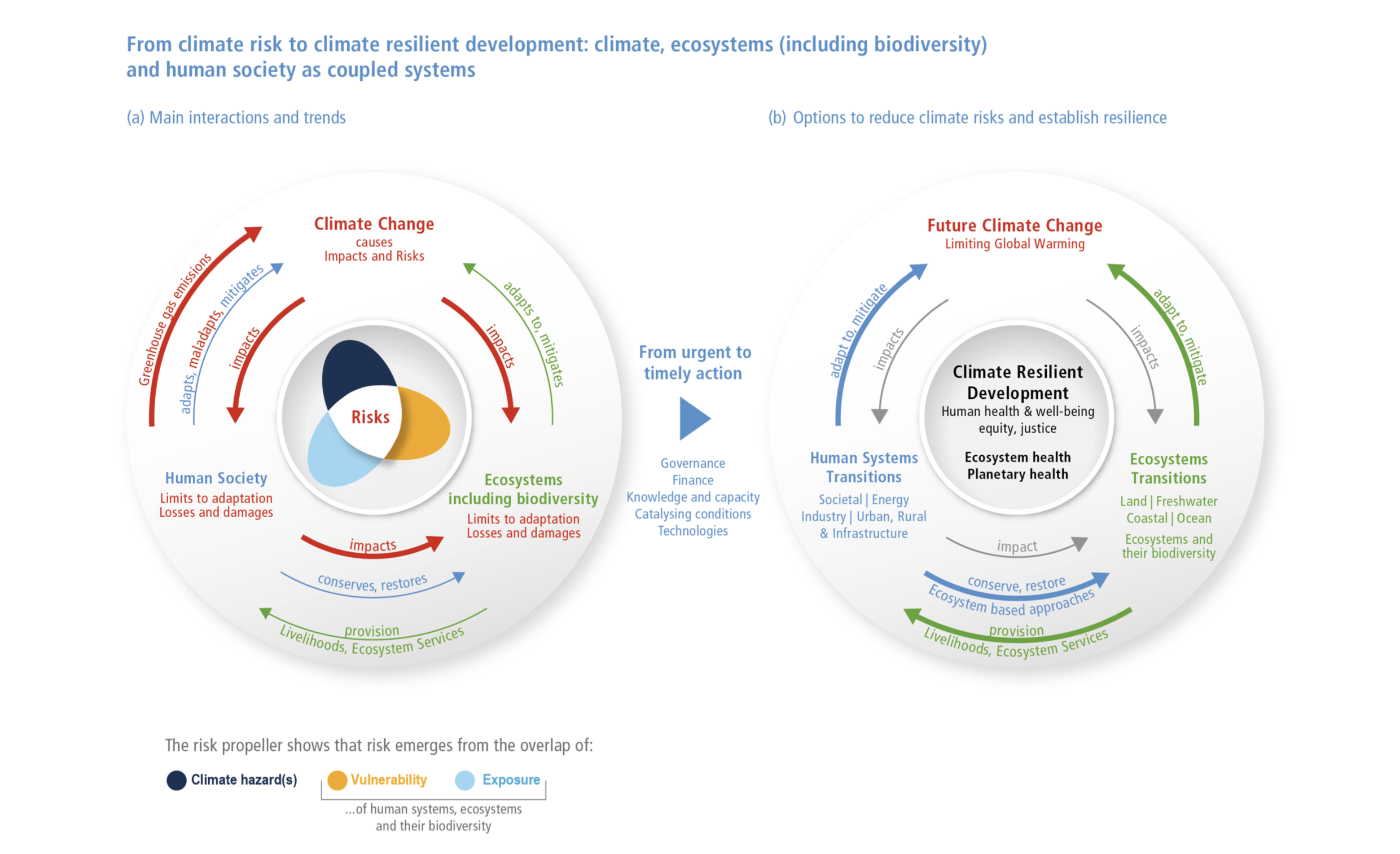
The Working Group II report examines multisystem interactions between human systems, the climate system, and nature, which result in nonlinear compounding risk and impact, which increases vulnerability. Image credit: IPCC.
Now is the time for urgent action to reduce risk, build resilience & protect people.
The report cites evidence (SPM.B.1.4) of already widespread and worsening direct health impacts on people and populations:
- Climate change has adversely affected physical health of people globally (very high confidence) and mental health of people in the assessed regions (very high confidence).
- Climate change impacts on health are mediated through natural and human systems, including economic and social conditions and disruptions (high confidence).
- In all regions extreme heat events have resulted in human mortality and morbidity (very high confidence).
- The occurrence of climate-related food-borne and water-borne diseases has increased (very high confidence).
- The incidence of vector-borne diseases has increased from range expansion and/or increased reproduction of disease vectors (high confidence).
- Animal and human diseases, including zoonoses, are emerging in new areas (high confidence).
Each of these areas of health impact exacerbates cost and risk, not only for those directly affected, but for whole societies.
As an organization devoted to the right of people to actively contribute to sustainable economies that help to secure a livable climate future, we celebrate the recognition that citizen engagement is critical. Effective adaptation planning means considering long-term risks and impacts, to properly gauge the cost effectiveness and high priority of acting early to mitigate, adapt, and build resilience.
The Working Group II report was produced by 270 authors from 67 countries, including 47 coordinating authors, 184 lead authors, and 39 review editors. 43% of the authors were from developing countries and 41% were women. The report also draws on the work of 675 contributing authors and over 34,000 cited references. Before reaching the final product, Working Group II received a total of 62,418 expert and government review comments.
In 2022, CCI will be working to integrate a long-term global adaptation standard of zero preventable harm into our work, including:
- Civic engagement around locally led adaptation and contributions to global mitigation;
- Resilience intelligence reporting on Reinventing Prosperity and climate-smart finance;
- Raising awareness about the value-building interactions between mitigation, adaptation, and resilience efforts;
- A global online consultation on a Zero Preventable Harm Global Goal on Adaptation.
STATEMENTS
Cathy Orlando, CCI Program Director, also serving as Women7 Advisor for the 2022 G7 Germany Summit:
“Mitigating and adapting to climate change requires evidence-based actions that are rooted in a human-rights based approach and gender-justice framework. We must ensure that financial policies, including but not limited to carbon pricing, subsidy reform, border carbon adjustments and special drawing rights do not burden or overlook women globally, in all their diversity.“
Rituraj Phukan, Founder, Indigenous People’s Climate Justice Forum and CCI National Coordinator for India:
“The report points out disproportionate impacts and the importance of indigenous, traditional and local knowledge in formulating responses, adaptation and resilience. The indigenous people of northeast India rank among the worst affected and my understanding is that chronic underdevelopment in the region should be central to any conversation about climate justice. The ‘Pakke Tiger Reserve 2047 Declaration on Climate Change Resilient and Responsive Arunachal Pradesh’ from November 2021, the first of its kind by any state government in the country, focuses on a climate resilient development solutions framework mooted by this new IPCC report, and other vulnerable states need to follow up with proactive policy decisions.”
Myra Jackson, Geoversiv Senior Advisor on Whole Earth Civics and Member of the UN Harmony with Nature Expert Platform:
“Bangladesh’s leadership of the Climate Vulnerable Forum emerged as a significant political force on climate change issues at COP26, and beyond the summit. Bangladesh scientists made significant contributions to the Locally Led Adaptation (LLA) process for building adaptation capacity of local vulnerable communities from the bottom up, enabling civic engagement. This led to an agreement at COP26 for member states to update NDC plans to reduce emissions of greenhouse gases, annually vs in 5 year gaps. While voluntary, many countries are expected to honor this agreement and update their NDCs by COP27.”
David Michael Terungwa, CCI Field Development Lead and Africa Coordinator
“The IPCC report on Impacts, Adaptation, and Vulnerability calls for more sincere and urgent climate action. The science is now clear on the need to rapidly move away from fossil fuels. Governments and the private sector know what needs to be done and must go far beyond rhetoric. Africa as one of the hotspots needs help. This means developed nations need to urgently fulfil their financial obligations to help in resilience building and energy transition, while also reducing their own emissions.”
PRESS FOLLOW-UP
- Access the Report and related information, here.
- Citizens’ Climate Nigeria will hold a small, focused roundtable for press on Friday, 4 March 2022.
- CCI is preparing a global consultation on the Zero Preventable Harm Global Goal on Adaptation.
- For more information, or to request an interview with one of our senior staff, please reach out to press@citizensclimateintl.org


